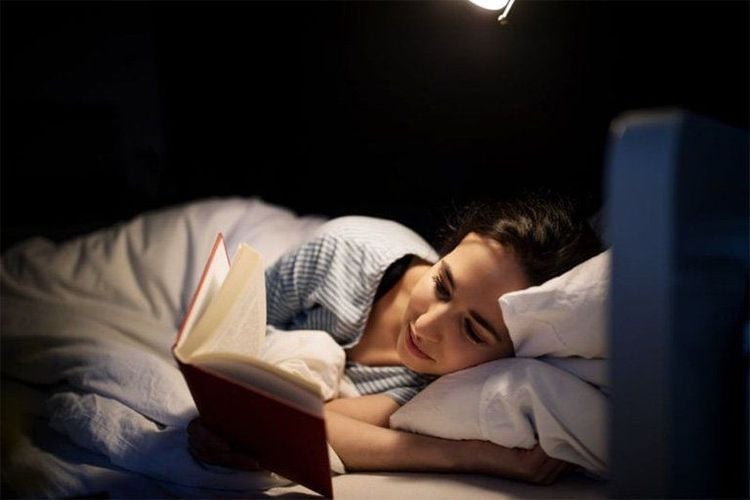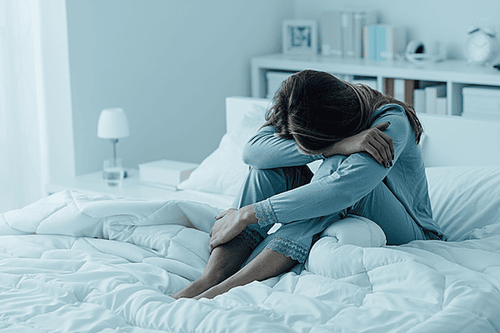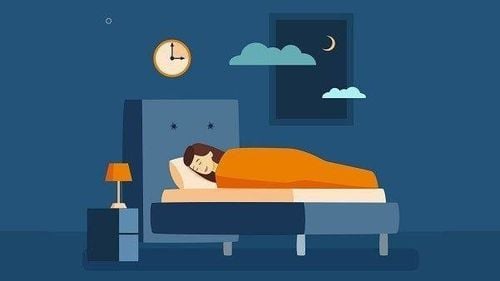This is an automatically translated article.
Good sleep is extremely important for health, it helps you feel good, comfortable and makes your body and brain function normally. However, for some people it will be severe and difficult to sleep through the night. So how to feel sleepy and how to practice early sleep habits for everyone.
1. How to sleep early?
Several factors can affect your ability to go to bed early. Maybe you're not a morning person, or you have a job or family obligations that keep you up late. Some sleep or mental health disorders, such as insomnia or anxiety, can make it difficult to fall asleep.
In other cases, the night may be the only time for you to relax, so you engage in delaying bedtime and stay up late for entertainment, which then negatively affects the day your next day.
On average, adults need seven to nine hours of sleep per night. However, 35% of Americans sleep less than seven hours at night. If the early schedule of work or school makes it difficult to get a full night's sleep, you may be wondering how to go to bed early, what is the way to sleep early?
Practicing sleep hygiene techniques can help train your body to go to bed earlier.
2. Ways to practice early sleep habits
2.1. Develop an evening routine
Bedtime routines are an effective, well-documented strategy for improving sleep in children. Incorporating relaxing activities before bed is also recommended for adults to improve sleep habits and get more sleep overall.
Your routine at night can include any relaxing activity:
Take a warm shower or bath: A shower or bath can help you de-stress and relax before bed. Plus, research shows that this habit lowers your internal body temperature, which can help you fall asleep faster and improve your sleep quality. Meditation: Practicing quiet, focused attention has a number of health benefits. Meditating close to bedtime can help reduce anxiety, on the other hand can help you stay awake, limit symptoms of insomnia, and reduce sleep disturbances. Reading: Reading is another great way to relax and induce sleep. It's important to note that some researchers have found that reading on a tablet rather than a book can make you less drowsy and delay deep sleep. Listen to music: Soft or soothing music can also help you relax before bed. Research shows that listening to soothing music helps to relax and improve sleep quality. Journaling: If stress and to-do lists keep you up at night, try writing down your worries in a journal. Studies have found that jotting down these mental issues on paper can help you fall asleep faster.

Giải đáp làm sao để ngủ sớm?
2.2. Managing blue light exposure
While it may be tempting to cuddle up with your phone before bed, the habit can wake you up later. Research shows that blue light suppresses the body's production of melatonin, the sleep hormone.
This can be useful in the morning, when you want to wake up. However, exposure to blue light in the evening can make it take longer to fall asleep, sleep less, and sleep of lower quality.
In addition to cell phones, common electronics such as televisions, computers, tablets, and even backlit e-books emit blue light. To avoid melatonin suppression and stay up later than desired, it's best to limit the use of these types of devices to the hours before bed. Some experts recommend leaving devices out of the bedroom entirely to resist the temptation to check notifications at night.
2.3. Maintain a consistent sleep schedule
If you go to bed at different times each day, it may be harder for you to fall asleep earlier. Waking up and going to bed at the same time each day helps your body form habits. Even on weekends and days when you want to sleep, it helps to maintain a consistent sleep schedule. When you adjust your sleep schedule earlier, it can help make the change in smaller 15-minute intervals.
Many people find that napping too late during the day can interfere with sleep at night. If you're trying to go to bed earlier, you may want to avoid sleeping in the afternoon and early evening.
2.4. Do exercise
Studies have shown that regular exercise in line with public health recommendations leads to better sleep. However, experts often recommend against doing intense exercise right before bedtime. Vigorous exercise less than an hour before you go to bed can slow falling asleep and decrease overall sleep time.
If you want to exercise before bed, try a low or moderate intensity activity. Some meditation movements such as yoga, tai chi, or qigong include a combination of stretching exercises and gentle breathing.
These activities can help you relax before bed. Yoga in particular has been shown to help improve the management of sleep problems and reduce stress.
2.5. Create a soothing bedroom environment
Another healthy sleeping tip is to make sure your room is well positioned for sleep. There are many steps you can take to create a comfortable bedroom environment:
Keep your room dark: Sunlight, lamps and light from electronic devices can all keep you awake longer you want. Blackout curtains can block out light from the sun or street lights. You can also use an eye mask. Lower the temperature: Slightly cooler rooms are generally ideal for sleep. If you live in a warm climate, it can be helpful to turn off your thermostat, use a fan, and invest in seasonally appropriate bedding. Eliminate noise: A quiet space allows you to fall asleep without distractions. Earplugs are a great way to block out sound. Machines or fans that make small noises can also mask unwanted noises. Set up a bedroom for sleep: To strengthen the mental association between your bed and sleep, avoid bringing your laptop to bed. Similarly, if you can't fall asleep after 20 minutes, go to another room and do a relaxing activity until you feel drowsy.

Tập thể dục thường xuyên giúp giấc ngủ ngon hơn
2.6. Avoid caffeine at the end of the day
While a cup of coffee at the end of the day can give you the motivation you need to complete a project, it can also keep you awake at night. Experts recommend avoiding stimulants including coffee, tea and energy drinks four to six hours before bedtime.
2.7. Try a natural sleep aid
Some natural sleep aids can help you fall asleep earlier:
Melatonin: Melatonin is a hormone that helps regulate your circadian rhythm by causing drowsiness. While not designed to be a long-term solution, a melatonin supplement taken right before bed may help some people fall asleep earlier. Herbal teas: Preliminary studies have demonstrated that drinking certain herbal teas can reduce fatigue and improve sleep quality. However, keep in mind that drinking too much liquid near bedtime can cause you to wake up at night to go to the bathroom, which can disrupt sleep. Aromatherapy induces sleep: Although current research is limited, aromatherapy is sometimes used to treat insomnia. For example, lavender can improve sleep quality. Consult your healthcare provider before trying a natural sleep aid method. Your doctor may have specific recommendations for your sleep goals. Your doctor can also help you identify any underlying sleep disorders that are preventing you from falling asleep early.
Follow Vinmec International General Hospital website to get more health, nutrition and beauty information to protect the health of yourself and your loved ones in your family.
Please dial HOTLINE for more information or register for an appointment HERE. Download MyVinmec app to make appointments faster and to manage your bookings easily.
References: healthline.com, sleepfoundation.org, webmd.com













